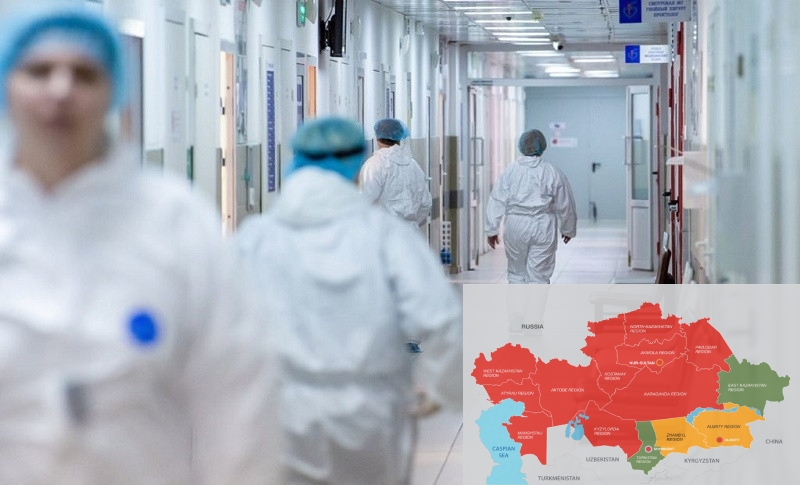StaffNUR-SULTAN – The state commission working to prevent the spread of the coronavirus infection decided to tighten restrictions in the cities of Nur-Sultan and Shymkent, as well as Karaganda and Atyrau regions that are currently in the high-risk red zone, the commission announced during their meeting on Wednesday.

At the end of June, Kazakhstan confirmed the presence of the Delta variant in the country. Click to see the map in full size.
The four regions account for 55 percent of COVID-19 morbidity and mortality across the country. The situation in the Kazakh capital appears to be especially dire.
“Over the past week, 7,989 cases of COVID-19 were registered in Nur-Sultan, which is 44.23 percent higher than the previous week (5,539 cases). The average daily registration of cases increased from 950 to 1,550. The weekly incidence rate per 100,000 population increased from 540.7 to 672.2 and the reproductive number is 1.304,” said Nur-Sultan’s Chief Sanitary Doctor Sarkhat Beisenova on a press briefing on July 16.
Overall, thirteen regions remain in the red zone – the cities of Nur-Sultan, Almaty, and Shymkent, as well as Akmola, Aktobe, Atyrau, West Kazakhstan, Karaganda, Kostanai, Kyzylorda, Mangistau, Pavlodar, and North Kazakhstan regions.
The Almaty and Zhambyl regions are in the yellow zone, and only East Kazakhstan and Turkistan remain in the green zone.
The regions located in the red zone will have their bus and minibus transportation between cities suspended, except for those participating in the Ashyq project, a mobile app that requires people to scan QR code when visiting public places to display their COVID-19 status as part of the effort to minimize the spread of the virus.
Indoor beaches and water parks will also be closed.
Cafe and restaurants can only serve up to 50 percent of their maximum capacity regardless of their participation in the Ashyq project. Cafe and restaurants that are not part of the Ashyq project will be open until 5 p.m. on weekdays and those that are part of the Ashyq project will work until 8 p.m. Both will be closed to the public on the weekends.
On weekends and holidays, public transportation, dining places, fitness centers, sports, and recreational facilities, spa centers, swimming pools, cinemas, theaters, computer clubs, educational centers, and exhibitions will be closed. The restriction include the businesses participating in the Ashyq project.
On weekdays, fitness centers, sport, and recreational facilities, SPA centers, and swimming pools participating in the Ashyq project will be working till 8 p.m.
Trade malls regardless of their participation in the Ashyq project will be working till 5 p.m. on weekdays, while cafes and restaurants participating in the Ashyq project are allowed to work till 8 p.m. and those not participating in the Ashyq project will have to close three hours earlier. On weekends, all trade malls will be closed, except for pharmacies and groceries stores located inside the trade malls.
Stores selling non-food products with an area of up to 1,000 square meters are open until 5 p.m. on weekdays and weekends. Stores with a retail area of more than 1,000 square meters and retail chains are open until 5 p.m. on weekdays and closed on weekends.
The opening hours of beauty and hairdressing salons, salons providing cosmetology services are from 8 a.m. until 9 p.m. on both weekdays and weekends.
Following the instructions given by President Kassym-Jomart Tokayev at the expanded government meeting on Saturday, Deputy Prime Minister Yeraly Tugzhanov, who is also the commission’s chair, told the meeting to develop a strategy that will revise the country’s measures against COVID-19, set deadlines for vaccination for small and medium businesses, and ensure the signing of an agreement with Pfizer.
Kazakhstan, where cases have been on the rise, reported its highest daily numbers since the pandemic began. Over the past day, the country confirmed 5,648 new cases bringing the total number to 477,754. This does not include the additional 58,335 coronavirus pneumonia cases, as Kazakhstan counts them separately.
934 patients are in severe condition, and 117 patients remain connected to a ventilator.
